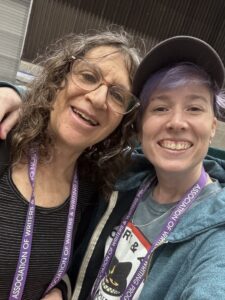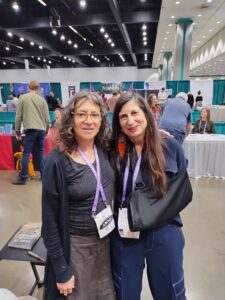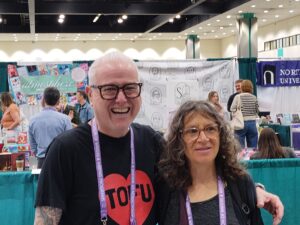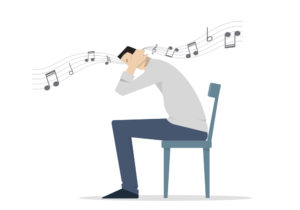Despite coming down with COVID a few days afterwards, my time at AWP, the big writing conference put on every year by Associated Writing Programs, greatly surpassed my expectations. This was huge, because my introvert interior had been raising a fair amount of ruckus trying to convince me not to go.
How did I get beyond my general dislike of intensive networking and chatting up strangers and vague acquaintances? I think Julie Andrews said it best–Confidence. (My 2 &1/2-year-old grandchild is obsessed with Do-Re-Mi, so I’ve been watching a lot of Julie Andrews, lately.)
I only went to AWP once before, ten years ago, when I was a student in an MFA program and at a low point in my writing life. As an older student who wasn’t into going out drinking every night after residency activities, I didn’t establish the strong connections that many of my classmates had. And I’d already achieved the goal held by so many–of publishing a novel (two, actually) with major publishers. The problem was I couldn’t seem to publish anything else because my books hadn’t met company sales expectations, even though both won awards and one went into six printings.
So I’d been floundering for a few years before I decided to take the plunge into an MFA program. Even then, the decision spurred more from the love of learning than with strong expectations of getting my writing life back on track. I certainly learned a bunch, but while the approach to learning writing through close analytical study and imitation of “successful” writers helped me polish many elements of craft, I felt like I was losing the connection to my own voice that I’d honed over the years with a more generative and positively focused approach.
And as my voice floundered and rejections continued to pour in, I lost my confidence.
What I remember about being at that AWP ten years ago was feeling that I didn’t belong. The journals and presses there were part of the MFA world, a world in which I didn’t feel included. So I didn’t talk to many of the people behind the tables. I walked the floor silently, feeling maybe a bit too sorry for myself. But when someone’s in the thick of writer depression, it’s hard to claw your way out.
So, what changed?
(1) Community: While I didn’t find a strong community in the MFA program, I did realize how important community was. It again took some arm-wrestling with the introvert, but shortly after I graduated, I started expanding my writing community. Forcing myself to go to a monthly reading put on by a local writers association led to an invitation to join a poetry critique group, which brought me a whole new circle of dear and trusted friends. And when the pandemic hit, joining on-line generative writing communities anchored near and far helped address the profound isolation of that time, even if it seemed strange to feel so connected to people I’d only seen in a box on my computer screen.
 And one thrill from this past AWP was to meet two of these people for the first time: Sage and Carla in real life.
And one thrill from this past AWP was to meet two of these people for the first time: Sage and Carla in real life.

(2) Persistence: Somehow I got back in the submission saddle. Big time. With a goal of getting 100 rejections every year. And with these rejections came acceptances. And many of the journals who accepted my work were at this year’s AWP. So I could go up to them and say, “Hi, you published a poem of mine in your journal. Thank you!” Hint: if you do this, it helps to have the name of the poem and the year it was published. And then, take a picture, as I did with Brian, who published my poem Horses in the Gully in his first edition of Tofu Ink, and bought my poetry book, Here in Sanctuary–Whirling.

In fact, it was my poetry book’s publisher Querencia’s participation at AWP that provided the final reason to draw me there, and I loved being part of an offsite reading they organized with Alternative Milk, fifth wheel press and many worl(d)s.place. But having community and a publishing track record kept my sulky introvert at bay as I walked the tables of the trade show floor. This time, I browsed journals and small press titles, asking editors what kinds of work they were looking for. My conversations affirmed that these editors were real people, with their own tastes, judgments, prejudices that were no more or less valid than mine. And while I didn’t do a Julie Andrews hop-skip or wave a guitar around, I felt confidence–not that I would necessarily be published by these journals, but that my work was valid and belonged in their reading queue. And more importantly, that I belonged.

